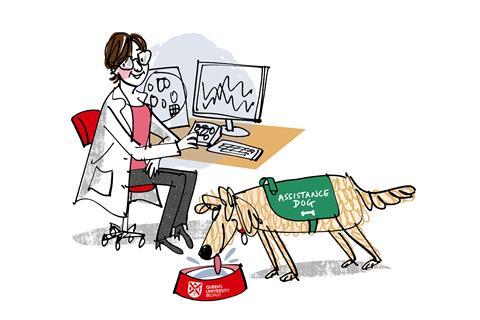When anxiety threatens, Phoenix is on hand to help

I have a constant companion – my assistance dog, Phoenix. He is a golden retriever-poodle cross who has been with me throughout my PhD journey at the QUILL Research Centre, based at Queen’s University Belfast. With him, my life both academically and personally took on a new meaning.
Assistance dogs come in many forms, with their training tailored to meet the specific needs of their handlers. In my case, Phoenix helps me navigate the daily challenges of being autistic and living with anxiety. His ability to recognise and alert me to the onset of anxiety has been truly life changing. I think people may underestimate his role in my day-to-day life when I appear to be doing well, but the reality is that he is constantly working, even behind the scenes. At home, during moments when anxiety overwhelms me, Phoenix steps in, providing comfort and grounding. His assistance prevents my anxiety from spiralling out of control, allowing me to manage difficult days better. Thanks to him, I’m able to leave the house on days that would otherwise be lost to anxiety.
Before Phoenix came into my life, pursuing a PhD felt unimaginable. During my undergraduate years, I struggled significantly with anxiety attacks, often feeling unable to attend lectures or engage in social interactions as I feared being unable to communicate effectively. However, everything started to change once Phoenix entered my life. His calming presence, combined with his training to recognise and mitigate my anxiety symptoms, allowed me to navigate these situations.
My journey to getting an assistance dog began during my school years when my pet dog, Charlie, would notice when I was upset and come sit beside me. My family noticed the impact he had on me and began looking into ways to train him. Unfortunately, at that time, there were no options in Northern Ireland for adults with autism.
A few years later, we found Pawsable, a UK-based assistance dog organisation. By then, Charlie was 10 and too old for the training, so we started looking for a suitable puppy. When I met Phoenix, I knew almost immediately that he had the potential to grow into an incredible assistance dog. His temperament, intelligence and natural drive to work were evident, and our bond began to form from that very first moment.
His calmness under pressure is one of the most important traits
Training Phoenix was deeply rewarding. With the guidance of our trainer, Malwina, and support from Pawsable, Phoenix and I made steady progress and passed the assessments. He quickly learned to detect signs of anxiety, offer deep pressure therapy by lying across my lap and help me navigate stressful environments by providing a buffer between me and others. His calmness under pressure is one of the most important traits for a puppy prospect to become a successful assistance dog.
This newfound confidence with Phoenix by my side played a crucial role in my decision to pursue a PhD. Even during the difficult time of Covid-19, my confidence grew, and I emailed Gosia Swadzba-Kwasny and John Holbrey about a PhD position focusing on using ionic liquids for plastic recycling. I had a Teams call to see if I was suitable, and both Charlie and Phoenix lay by my feet and give me the reassurance that they were there if I needed them. At the time a didn’t mention that I had an assistance dog in training as I wanted to focus on my research potential and not risk the potential assumptions on my capabilities. I had nothing to worry about and they are now my PhD supervisors.
In October 2021, I officially began my PhD, and Phoenix became a regular part of my daily routine at Queen’s University Belfast. One of the highlights of my PhD journey has been the opportunity to travel to conferences, an experience that would have been incredibly challenging without Phoenix. There are extra costs associated with travelling with an assistance dog, but thanks to the Royal Society of Chemistry’s accessibility grant, funded by the Chemist’s Community Fund, I was able to bring Phoenix on these trips.
None of this would have been possible without the unwavering support of my PhD supervisors and the entire research group at the QUILL Research Centre. From the beginning, they were incredibly understanding and accommodating of my needs as both an autistic student and someone who relies on an assistance dog. They ensured that Phoenix was welcomed into the research environment and respected that he was there to do a job.
In addition to my supervisors, the broader support network from Pawsable has been invaluable. Malwina, our trainer, played a crucial role in helping Phoenix reach his full potential as an assistance dog, and I am forever grateful for her expertise and dedication.
As I approach the final year of my PhD, I can confidently say that Phoenix has far exceeded all my expectations. I haven’t yet decided what the future holds for us, but I know we’ll tackle it together. I’m excited to see where life takes us both, in chemistry and in the assistance dog world.












No comments yet